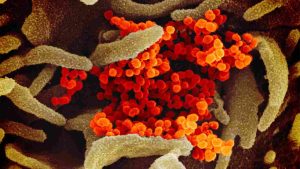- Have any questions?
- +880-1832219025
- englishrajib877@gmail.com
Dialogue between two Friends about Coronavirus
Gap Filling Activities with Clues for SSC
November 8, 2021Gap filling activities without Clues for SSC
November 11, 2021Dialogue between two Friends about Coronavirus

Dialogue between two friends about Coronavirus
Write a Dialogue between two friends about Coronavirus
Let’s learn the Dialogue between two friends about Coronavirus
Jeremy: Good evening, Brittney.
Brittney: Good evening. How do you do?
Jeremy: I am very well. It was a long time since I had met you last. What are you doing now?
Brittney: I am writing an article on Covid-19.
Jeremy: That sounds great! I would like to know about Covid-19 from you. Would you please let me know details about it?
Brittney: Sure, why not?
Jeremy: Coronavirus refers to a class of viruses that infect mammals and birds. Coronavirus causes respiratory infections in humans.
Brittney: Anything else?
Jeremy: Of course. Infection of a species of coronavirus was found on December 31, 2019, in Wuhan, China.
The World Health Organization officially named the virus ‘2019-NCOV’.
Brittney: What are the symptoms of coronavirus?
Jeremy: The symptoms of coronavirus are fever, exhaustion, dry cough, vomiting, shortness of breath, sore throat, headache, stomach problems, loss of taste in the mouth and nose.
Brittney: How can we be affected by coronavirus?
Jeremy: The virus spreads in the form of droplets through the sneezes and coughs of the infected person.
In addition, an infected person can spread the virus through their phlegm, mucus if they spit out their phlegm, mucus, or when they sneeze or touch the mouth or nose with their hands without using an eyebrow.
Brittney: How can people keep themselves free from coronavirus?
Jeremy: People can keep themselves free from coronavirus by practicing good hand hygiene, avoiding coughing or sneezing into the hands, staying home, considering alternatives to shaking hands, and trying to avoid touching their faces.
Brittney: What are the treatment of coronavirus?
Jeremy: Getting plenty of rest, drinking water regularly to stay hydrated, taking an over-the-counter pain reliever, drinking warm liquid, and sitting upright to ease a cough, etc.
Brittney: Thank you very much for your information.
Jeremy: You are most welcome!

Paragraph-Corona Virus (COVID-19)
COVID-19, caused by the novel coronavirus SARS-CoV-2, has profoundly impacted the global landscape since its emergence in late 2019.
This highly contagious respiratory virus has sparked an unprecedented global health crisis, affecting millions of lives and challenging societies, economies, and healthcare systems worldwide.
Characterized by symptoms ranging from mild respiratory distress to severe pneumonia, COVID-19 has showcased the interconnectedness of our globalized world.
Governments and health organizations have implemented a myriad of measures to curb the spread of the virus, including lockdowns, social distancing, and vaccination campaigns.
The pandemic has underscored the importance of international collaboration and information sharing in combating such global threats.
Beyond its direct health effects, COVID-19 has exposed and exacerbated existing social and economic inequalities, disproportionately affecting vulnerable populations.
The virus has prompted accelerated scientific advancements, leading to the rapid development of vaccines, which have become crucial tools in controlling the pandemic.
As nations grapple with ongoing challenges, including new variants and vaccination distribution, the long-term impact of COVID-19 on public health, economies, and societal norms remains a topic of ongoing study and concern.
The pandemic has forced societies to adapt, innovate, and reflect on the resilience of healthcare systems, preparedness for future crises, and the importance of collective action in the face of global health challenges.
Dialogue between two friends about Coronavirus
Sample-2
Friend 1: Hey there! How’s everything going with you?
Friend 2: Hey! Not bad, just trying to stay sane in these crazy times. Have you been keeping up with the latest on the coronavirus?
Friend 1: Yeah, it’s hard to ignore. The situation seems to be constantly changing. How are you feeling about it?
Friend 2: Honestly, it’s a bit overwhelming. The news is filled with updates, and it’s hard to know what’s accurate. How are you coping with all of it?
Friend 1: I get that. It’s definitely a challenge to sift through the information. I’m trying to stay informed but not let it consume me. How about you?
Friend 2: Same here. I’m keeping an eye on the news but trying not to obsess over it. I’ve been following guidelines, wearing masks, and practicing social distancing.
Friend 1: Good call. It’s crucial to take those precautions. Have you gotten vaccinated?
Friend 2: Yeah, I got vaccinated as soon as I could. It’s one less thing to worry about, and I feel a bit safer now. How about you?
Friend 1: Absolutely, got my shots too. It’s a relief knowing we’re doing our part. But you know, the whole situation has really changed our daily lives.
Friend 2: True that. I miss the days when we could just hang out without worrying about masks and distancing. It’s been tough, hasn’t it?
Friend 1: Definitely. But I’m hopeful things will get better. It’s just a matter of time, and we need to keep doing our part. How have you been managing socially?
Friend 2: It’s been challenging, but thank goodness for video calls. It’s not the same, but it helps. And I’ve been trying to find other activities to stay sane. What about you?
Friend 1: Video calls have been a lifesaver for sure. I’ve picked up some new hobbies and tried to stay connected with friends online. It’s important to adapt, I guess.
Friend 2: Absolutely. We’re all in this together. Let’s hope for better days ahead and that we can get back to normal soon.
Friend 1: Fingers crossed! Until then, let’s stay safe and keep supporting each other.
Friend 2: Agreed! Take care, and let’s catch up again soon.
Composition- Corona Virus
The coronavirus, also known as COVID-19, emerged as a global pandemic in late 2019, presenting an unprecedented challenge to public health, economies, and societies worldwide.
Belonging to the family of viruses that includes the common cold, severe acute respiratory syndrome (SARS), and Middle East respiratory syndrome (MERS), the novel coronavirus primarily spreads through respiratory droplets when an infected person coughs, sneezes, or talks.
The virus primarily targets the respiratory system, causing symptoms ranging from mild cold-like symptoms to severe respiratory distress.
As governments and healthcare systems worldwide grappled with the rapid spread of the virus, unprecedented measures such as lockdowns, social distancing, and widespread testing became the norm to curb transmission.
The impact of the coronavirus extended far beyond the realm of health, triggering a global economic downturn.
Industries faced disruptions, businesses shuttered, and millions of people lost their jobs. The virus also underscored and exacerbated existing social and economic inequalities, with vulnerable populations disproportionately affected.
Educational systems had to adapt to remote learning, and the way people worked underwent a fundamental shift with the rise of telecommuting.
The pandemic highlighted the interconnectedness of the modern world, emphasizing the need for international cooperation to address global challenges effectively.
The development and distribution of vaccines emerged as a crucial aspect of the global response to the pandemic.
Scientists and pharmaceutical companies worked at an unprecedented pace to develop and test vaccines, ultimately leading to the authorization and distribution of several vaccines for emergency use.
Vaccination campaigns were launched worldwide, aiming to achieve widespread immunity and curb the spread of the virus.
However, challenges such as vaccine distribution inequities, vaccine hesitancy, and the emergence of new variants kept the world on alert, emphasizing the need for ongoing vigilance and adaptability in the face of the evolving virus.
The coronavirus pandemic also prompted a reevaluation of public health infrastructure and preparedness.
Countries worldwide recognized the importance of robust healthcare systems, early detection mechanisms, and international collaboration in addressing global health crises.
The crisis prompted innovations in healthcare, such as the rapid development of diagnostic tests, therapeutic treatments, and new approaches to vaccine production.
Lessons learned from the pandemic underscored the need for proactive measures to prevent, detect, and respond to emerging infectious diseases in the future.
Beyond the immediate health and economic impacts, the coronavirus pandemic had profound social and psychological effects.
Lockdowns, social isolation, and the loss of loved ones took a toll on mental health globally. The importance of mental health support and resilience gained increased recognition as societies grappled with the emotional fallout of the pandemic.
Additionally, the crisis sparked reflections on the role of science, misinformation, and communication in shaping public perceptions and responses during times of uncertainty.
In conclusion, the coronavirus pandemic represents a defining moment in modern history, challenging the resilience of societies, economies, and healthcare systems worldwide.
As the world navigates the complex and evolving landscape of the pandemic, it becomes evident that a collaborative and adaptive approach is essential to effectively address the multifaceted challenges posed by the virus.
The lessons learned from this global crisis will likely shape public health policies, international cooperation efforts, and societal norms for years to come.
Frequently Asked Questions (FAQ) on Coronavirus (COVID-19)
What is COVID-19?
COVID-19, or Coronavirus Disease 2019, is an infectious respiratory illness caused by the severe acute respiratory syndrome coronavirus 2 (SARS-CoV-2). It was first identified in December 2019 in Wuhan, China, and has since become a global pandemic.
How does COVID-19 spread?
The virus primarily spreads through respiratory droplets when an infected person coughs, sneezes, or talks. It can also spread by touching a surface or object contaminated with the virus and then touching the face, especially the eyes, nose, or mouth.
What are the symptoms of COVID-19?
Common symptoms include fever, cough, and shortness of breath. Other symptoms may include fatigue, muscle or body aches, loss of taste or smell, sore throat, headache, and more severe respiratory symptoms in some cases.
How can I protect myself and others from COVID-19?
Practice good hygiene, including frequent handwashing, wearing masks in crowded places, and maintaining physical distance from others. Follow public health guidelines, get vaccinated, and stay informed about the latest updates.
Is there a vaccine for COVID-19?
Yes, several vaccines have been developed and authorized for use against COVID-19. Vaccination is a crucial tool in controlling the spread of the virus and preventing severe illness and death.
How effective are the COVID-19 vaccines?
COVID-19 vaccines have proven to be highly effective in preventing severe illness, hospitalization, and death. Effectiveness may vary among different vaccines, but all authorized vaccines provide significant protection against the virus.
Can I still get infected after being vaccinated?
While breakthrough infections can occur, fully vaccinated individuals are much less likely to develop severe illness. Vaccination significantly reduces the risk of hospitalization and death from COVID-19.
What should I do if I suspect I have COVID-19?
If you experience symptoms or have been in contact with someone with COVID-19, get tested. Follow public health guidelines, self-isolate, and seek medical advice if necessary. Contact your healthcare provider for guidance.
How long does it take for symptoms to appear after exposure to the virus?
Symptoms typically appear 2 to 14 days after exposure, with an average incubation period of around 5-6 days.
Can children get COVID-19?
Yes, children can get infected with the virus, but they often have milder symptoms compared to adults. It’s important to follow guidelines to protect children, and vaccination is recommended for eligible age groups.
What is the long-term impact of COVID-19?
Some individuals may experience long-lasting symptoms after recovering from the acute phase of the illness, a condition commonly referred to as “long COVID.” Symptoms may include fatigue, shortness of breath, and cognitive issues.
How can I stay informed about COVID-19 developments?
Stay updated through reliable sources such as public health agencies, government websites, and reputable news outlets. Follow guidelines provided by health authorities in your area.
Are there new variants of the virus, and should I be concerned?
Yes, new variants of the virus that causes COVID-19 have been identified. Some variants may spread more easily or have different characteristics. Ongoing research is being conducted to understand the impact of these variants, and public health measures may be adjusted accordingly.
Should I wear a mask, even if I am fully vaccinated?
Public health recommendations may vary, but wearing masks, especially in crowded or high-risk settings, remains a valuable preventive measure. Stay informed about local guidelines and adapt your behavior accordingly.
Can I travel during the COVID-19 pandemic?
Travel restrictions and guidelines vary by location and can change rapidly. Check with relevant authorities for the latest information on travel advisories, testing requirements, and quarantine protocols before planning any trips.
How long does immunity from COVID-19 or receiving the vaccine? last after recovering
The duration of immunity can vary. Natural immunity after recovering from COVID-19 may wane over time, and breakthrough infections can occur. Vaccination provides robust and longer-lasting protection, but the need for booster doses is being explored.
Can pregnant individuals receive the COVID-19 vaccine?
Yes, COVID-19 vaccination is recommended for pregnant individuals. Consult with healthcare professionals to discuss individual risks and benefits.
Can animals spread COVID-19?
While there have been instances of animals testing positive for the virus, the main spread is human-to-human. It’s advisable to practice good hygiene, including washing hands, if you have contact with pets or animals.
Are there treatments available for COVID-19?
Several antiviral treatments and medications have been authorized for use in treating COVID-19. Early detection and medical intervention are crucial in managing the illness.
How can I support mental health during the pandemic?
Maintain a routine, stay connected with loved ones, and seek professional help if needed. Many mental health resources are available online, and it’s essential to prioritize self-care during these challenging times.
Can I donate blood if I’ve had COVID-19 or received the vaccine?
In many cases, individuals who have recovered from COVID-19 or received the vaccine can donate blood. Check with local blood donation centers for their specific eligibility criteria.
What should I do if someone in my household has COVID-19?
Follow public health guidelines for isolation and take precautions to prevent the spread within the household. Seek medical advice if needed and stay informed about when it’s safe to end isolation.






4 Comments
A great dialogue
thank you so much!
Very nice 👍
Very nice 👍